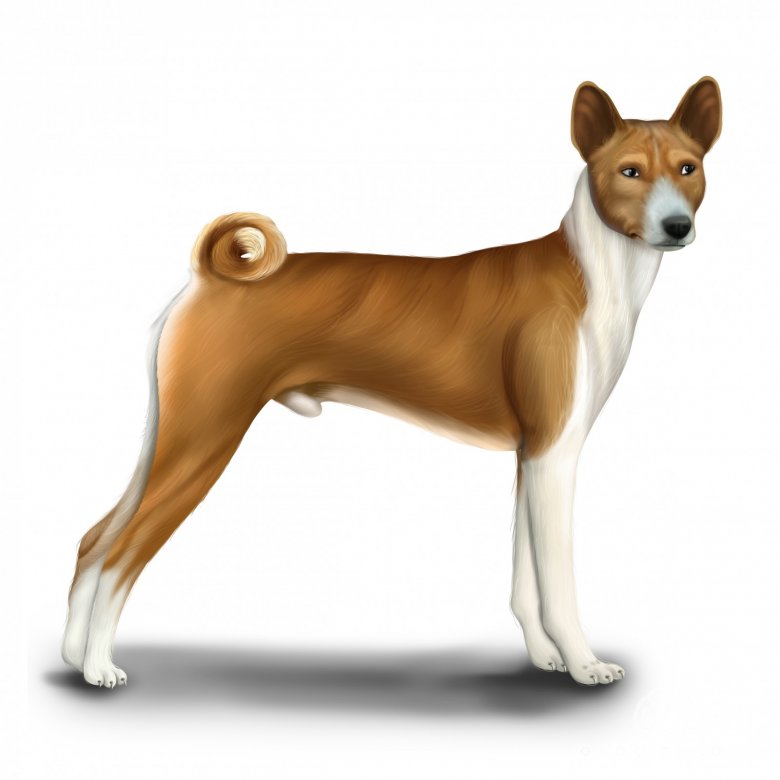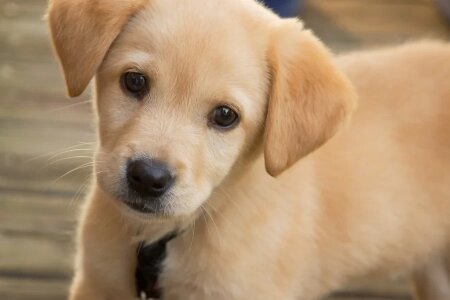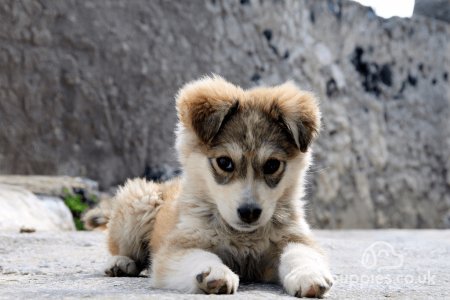Basenji (The Barkless Dogs, African Bush Dogs)
Overview
From being first depicted in the tombs of the pharaohs of Ancient Egypt 4500 years ago, the Basenji breed is one of the more noble pedigrees that we have today. This hound is used for hunting activities due to his lack of body odour making him an excellent predator.
With their wrinkled foreheads and small pointy ears, Basenjis are often placed very highly in Crufts. However, do not be fooled by their innocent looks. This breed enjoys being mischievous and has a high prey drive, meaning they must be watched when outside the house so no harm occurs to themselves or other animals.
Highlights:
Basenjis make fantastic guard dogs due to them always being on alert and aware of their surroundings. However, they are not aggressive, so they will never attack, just cause attention to be brought to any foreign movements in their home
The Basenji breed is naturally clean, often having his grooming habits compared to that of a cat’s, spending hours cleaning his fur and his paws. This means that they are easy to maintain and will not be a hassle bringing mud into the house!
This breed is extremely loyal to everyone in the owner’s family but tends to form a close relationship with one certain individual.
Physical Appearance
These graceful and striking dogs have an intelligent appearance to them, with their pricked ears and tilting heads atop their strong yet slight body, and their curling tails giving them an alert stance. They are agile and athletic, helping them with their hunting practices.
This breed can be seen in a variety of different colours, often having a mixture of two together. Commonly, their coats can be a mix or block colours of black and white, brindle, tan, red, and sometimes even tricoloured. For this breed, any white colour that the dog has must be on the dog’s feet, chest and tails.
It is important to know this when looking at the breeding of your potential puppy, to ensure that the Basenji pedigree remains pure throughout.
How big do Basenjis get?
Height: Males tend to grow to around 41 - 43cm, whilst females remain smaller. Growing to 38 - 40cm.
Weight: Similarly to their height, males weigh in at a heavier 10 - 12kg whilst the females remain more slight at 9 - 11kg
Character Traits
Whilst Basenji dogs are overall the perfect family companion, their intelligence and stubbornness mean that this breed is very difficult to train. They do not have the need to make their owners happy, and although they understand what is being asked of them, they will often act as if they do not.
Their high energy levels also mean that they are dogs that should not be left alone, not because of separation anxiety but due to them being mischievous and having the potential to cause trouble if they do not get enough mental stimulation. They adore attention and cuddling on the sofa, but this is more likely to happen solely with their own family, as they can be wary of strangers at first. Having said this, they are not aggressive dogs unless heavily provoked, and Basenjis are more likely to alert their owners of a new person or object rather than attack, which makes them excellent watchdogs.
Due to their hunting background, Basenji dogs do have a high prey drive, meaning that they can view smaller animals as something to chase instead of something to watch. This must be monitored and often means that Basenji should be kept on a lead when going on walks. Once their hunting instincts kick in, it may be difficult for owners to control them.
Are Basenji dogs intelligent? - Yes
Are Basenji dogs affectionate? - Yes
Do the Basenji dogs have high or low energy levels? - High
Are Basenji dogs loyal? - Yes, very
Are Basenji dogs playful? - Yes
Are Basenji dogs aggressive? - No
Are Basenji dogs easy to train? - No
Are Basenji dogs good guard dogs? - Yes
Ability to Socialise
With Basenji regularly being used as watchdogs, they tend to dislike strangers and people that are not a part of their family. Their loyalty is a very strong part of the Basenji’s characteristics and therefore they will alert their family when they see something that strays from their norm. Their devotion includes their relationship with children, often becoming protective of them.
Furthermore, The Basenji dogs typically have a high prey drive, which makes them often a risk when they go out of the house as they try to chase anything interesting that moves, especially small animals such as rabbits and squirrels. However, if a younger Basenji is being brought into a family with lots of pets, early socialisation is key in order for there to be harmonious living with this breed.
This also relates to the way that the Basenji interact with other dogs. Where they may be cautious at first, they will become sociable if introduced at a young enough age.
Do Basenji dogs get along with other pets? - No
Do Basenji dogs get along with other dogs? - Yes
Are Basenji dogs good with kids? - Yes
Are Basenji dogs good with strangers? - No
Lifestyle Suitability
Basenji are overall very easy dogs to live with. They clean themselves, they are hypoallergenic and can live in an apartment happily due to their size. To balance living in a small environment, Basenjis must have adequate exercise time and playtime to sustain their mental stimulation. If this breed gets bored, there could be a chance of them becoming loud in an effort to gain attention.
Unlike other breeds, Basenji dogs ‘yodel’, sounding similar to a howl instead of barking. They also enjoy the sound of their own voice, and therefore there is potential for them to be a loud presence in the house, which is important to note when considering adopting or purchasing a Basenji puppy.
Are Basenji dogs good for first-time owners? - No
Are Basenji dogs hypoallergenic? - Yes
Are Basenji dogs prone to drooling? - No
Are Basenji dogs a good breed for apartment living? - Yes
Do Basenji dogs shed a lot? - No
Do Basenji dogs bark a lot? - They don’t bark, but they make their own unique sound described as a ‘yodel’, and they make this noise a lot
Can Basenji dogs be left alone at home? - No
Can Basenji dogs handle the heat? - Yes
Can Basenji dogs handle cold temperatures? - Yes
Are Basenji dogs sensitive to loud noises? - Yes
General Health & Health Issues
The Basenji breed is a naturally healthy breed, with good lineage and ancestors. Using the coefficient of inbreeding (COI), where scientists say that a COI under 10% shows better health, Basenjis lie around 2%, indicating that they are one of the purest and healthiest breeds today.
However, they can have some natural health issues. These can include Hip Dysplasia, which is a canine disease that affects the hip joint; it first occurs as the puppy grows but becomes evident and painful in later years. Due to their ears sticking up, they can also have aural issues and must have their ears checked regularly.
How long do Basenji dogs live? - 12 - 14 years
Exercise & Play Time
Although Basenji dogs can live in apartments and smaller houses, it is important to allow them to have enough exercise to balance out their day and avoid boredom. This is particularly important for this breed as they can become a handful if they do not have the correct mental stimulation.
They are definitely more suited to people that can work from home or a household that always has someone staying in as they cannot be left alone for long periods of time. Their prey drive is so strong that Basenjis can often forget that they do not enjoy the water and chase their prey even into rivers and lakes. This should be remembered as they might not be as strong a swimmer as other breeds such as the Labrador.
How much exercise does a Basenji dog need? - 2 x 30 minutes per day, with equal amounts of playtime
Do Basenji dogs like water play? - No, but if they are chasing something they will go in the water
Nutrition & Feeding
Basenji dogs are a very healthy breed and therefore are not susceptible to weight gain. There are no foods that this breed should outright avoid, but it is nevertheless important as with all dogs for Basenjis to get food that will provide them with adequate protein, fats, minerals, and vitamins in order to fuel their busy and active lives.
Basenjis are naturally slight dogs and therefore it is important to maintain their condition as their structure is not built for weight gain. However, it is important that owners speak to the vet in order to understand exactly what their individual Basenji should be eating.
Are Basenji dogs prone to weight gain? - No
How much should I feed a Basenji puppy? - 3 to 4 small meals a day
How much should I feed an adult Basenji dog? - 2 meals a day of 1 cup of hard food
Care & Maintenance
As this breed tends to take care of himself by regularly cleaning, Basenjis do not require much maintenance by their owners. Their short coats also mean that they do not need to be brushed regularly or bathed, but it is recommended that this breed should be bathed once every 6 months just to remove any ingrained dirt or dead hair, thus keeping their skin healthy.
History of the Basenji
The Basenji are one of the oldest dog breeds known today, with pictures of dogs that have a similar build to the Basenji having been carved into the walls on Pyramids and tombs in Ancient Egypt. Their name stems from the Ituri people of the rainforest who named this breed the ‘Basenchi’, which means ‘little bush thing’.
This breed was first discovered in the Congo in 1682 by an explorer named Merolla, and then first brought to the UK in 1939 during World War 2. Back then, Basenji dogs were noticed for their scenting skills and athletic bodies, and even today they are being used by pygmies for hunting lions.
Interesting Facts About Basenji Dogs
Instead of barking, Basenjis produce a sound that is described as being more similar to a ‘yodel’ due to their flat larynxes, which gives them the title of the ‘silent’ or ‘barkless’ dog. They make this noise as they use it in the wild to communicate with their pack if they have become lost or if they must regroup;
A Basenji placed first in the Best in Show class at Crufts in 2001;
Unlike other breeds, female Basenjis only have one season a year, which is usually in Autumn;
Basenji dogs are athletic and can run up to a speed of 25mph (around 40km/h)
Getting a Basenji Puppy
Getting a puppy should be a very exciting experience for owners, but there can also be issues when researching what breed suits their needs best. For Basenjis, it is important that there is someone at home for the majority of the time, as well as that you keep them active and put aside adequate time for exercise. Please see the buying guide to read more about purchasing a puppy, whether it is your first time buying or you are an experienced owner. You should always be aware of scams and poor lineage in this breed, therefore it is important for you to visit the puppy and the breeders before any money is exchanged. Remember to check for the white parts on the dog - they should only have white on their feet, chest and tips of their tail. The purer the breed, the more probable it is that they will have fewer health issues in the future.
How much does a Basenji cost to buy? - £500 - £1000
How much does a Basenji cost to feed? - £30 - £50
How much does insurance for a Basenji cost? - £700 per year
As much as it is important for Basenjis to be purebred and therefore easier to purchase as a puppy, potential owners should still consider the adoption of a slightly older dog of this breed. Please find links below where you can find out more about rescuing and adopting, as well as possible homes where Basenjis can be found:











